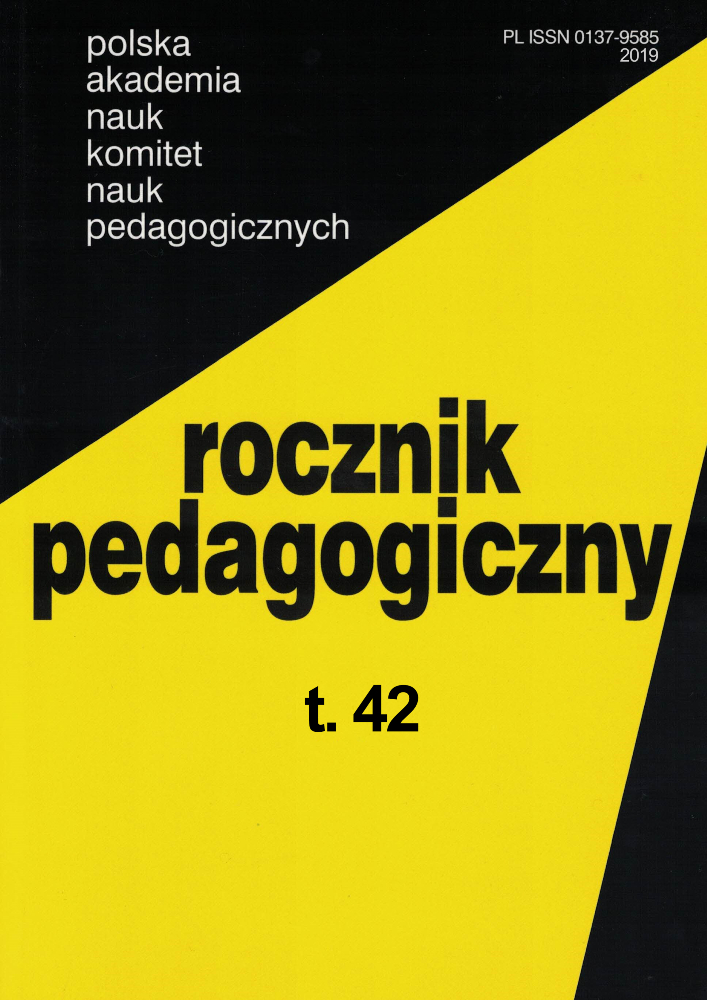Abstrakt
The research study addresses the burnout of teachers who teach in regular schools vs. burnout among teachers who teach in youth villages in Israel. The research participants consist of 73 teachers who work with at-risk youths in youth villages in Israel and 70 teachers who work in regular schools, making a total of 143 teachers. A 5-segment self-reporting questionnaire was distributed. The study found a difference in how teachers refer to the factors influencing their departure. In the youth villages, as the factors of support are greater, the factors of departure are more significant. Hence, it is possible to understand that the conclusion that arises from the study is that in order to prevent teacher burnout it is necessary to create many more sources of support, both in regular schools and in youth villages.
Bibliografia
Chang M.L., An Appraisal Perspective of Teacher Burnout: Examining the Emotional Work of Teachers, “Educational Psychology Review” 2009, 21, 193–218.
Dagan D., The Relationship of Coping and Locus of Control to the Adjustment of Immigrant Stu- dents from Ethiopia to the Boarding High School, Master Thesis, Bar Ilan University, School of Social Work, Ramat Gan 1997 (Hebrew).
Dvir A., Self-Efficacy and Peer Support, Burnout and Secondary Trauma in a Work Environment Filled with Pressure among Staffs in the Boarding Schools and Children and Youths At Risk. Ph.D. Dissertation, Bar-Ilan University 2007 (Hebrew).
Fisherman S., Professional Identity and Burnout among Teaching Workers, Shanan, Haifa 2016 (Hebrew).
Friedman Y., Lotan A., Mental Burnout of the Teacher in Israel in Elementary Education, Research Report, Henrietta Szold Institute, 1985 (Hebrew).
Friedman Y., Lotan A., Stress and Burnout in Teaching – Causes and Ways of Prevention, Jerusalem: Henrietta Szold Institute1993 (Hebrew).
Gavish B., Friedman I.A., Novice Teachers’ Experience of Teaching: A Dynamic Aspect of Burnout, “Social Psychology of Education”2010, 13 (2), 141–167.
Gavish B., Friedman Y., The Teacher as an Organizational Person: The Contribution of the Per- ceived Work Environment of the Beginning Teacher to the Prediction of Burnout in the Begin- ning and at the End of the First Year of Work, “Studies in the Administration and Organization of Education” 2007, 29, 55–81 (Hebrew).
Greenfeld A., The Technological Pedagogical Center, The Educational Networks of the Economic Union of Workers in Israel, “The Technological Pedagogical Center, the Amal Network, the Pedagogy Department” 1990 (Hebrew).
Grupper E., To Be an Instructor in the Boarding School: An Ethnographic Investigation of the Pro- cess of the Professional Socialization of New Workers to Their Role, Doctoral Dissertation, School of Education, Haifa University, Haifa 1992 (Hebrew).
Grupper E., The Boarding Schools in Israel: An Original Creation of the Educational System, [in:] Boarding School Education in Israel, ed. S. Shamay, The Educational Center, The Administra- tion for Community Education and Youth Immigration, Tel Aviv 2004 (Hebrew).
Grupper E., Boarding Schools in Israel: Social Educational Frameworks and Their Dimensions, [in:] S. Romy, M. Shmeyda (eds.), Informal Education in a Changing Reality, Magnes Press, Jerusalem 2007 (Hebrew).
HaCohen D., Children of Time: Youth Aliyah, 1933–1948, Yad Vashem, The International Ins, Je- rusalem 2001.
Keshti Y., Manor A., Boarding Schools in Israel: Continuity and Change, Tel Aviv University, Tel Aviv 1988 (Hebrew).
Levy Z., The Lifestyle in the Boarding School and the Shaping of the Identity of Adolescents, [in:] Com- munities of Youths, eds. Y. Keshti, S. Shlasky, M. Arieli, Ramot, Tel Aviv 2000 (Hebrew), 21–33.
Pritzker D., Chen D., Factors of Burnout in Teaching among Teachers in Their First Years of Work, “Study and Research in the Training of Teachers” 2010, 12 (Hebrew).
Skaalvik E.M., Skaalvik S., Does School’s Context Matters? Relations with Teacher Burnout and Job Satisfaction, “Teaching and Teacher Education” 2009, 25 (3), 518–524.
Struyven K., et al., Why Do They Want to Teach? The Multiple Reasons of Different Groups of Students for Undertaking Teacher Education, “European Journal of Psychology” 2012, 1–16.
Wosner Y., Golan M., Arad-Davidson B., Quality of Life in the Boarding Schools for Children and Youths in Israel: Summative Research Report, Ministry of Labor and Welfare, Jerusalem 1993 (Hebrew).
Van Droogenbroeck F., Spruyt B., Vanroelen C., Burnout among Senior Teachers: Investigating the Role of Workload and Personal Relationships at Work, “Teaching and Teacher Education” 2014, 43, 99–109.
Licencja
Prawa autorskie (c) 1970 Vered Azulay

Utwór dostępny jest na licencji Creative Commons Uznanie autorstwa – Użycie niekomercyjne – Bez utworów zależnych 4.0 Międzynarodowe.
